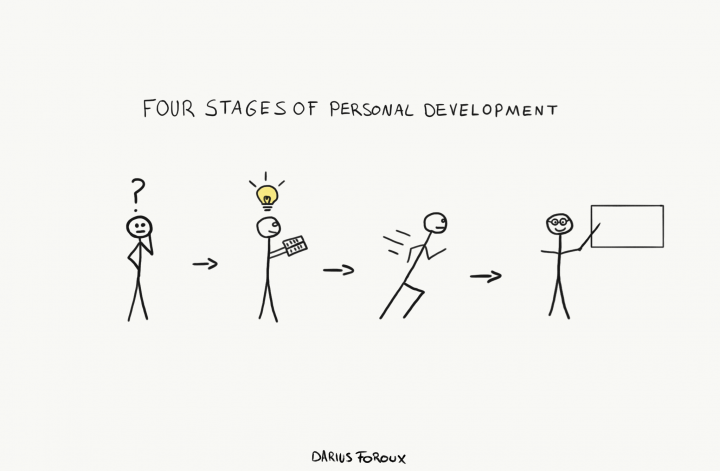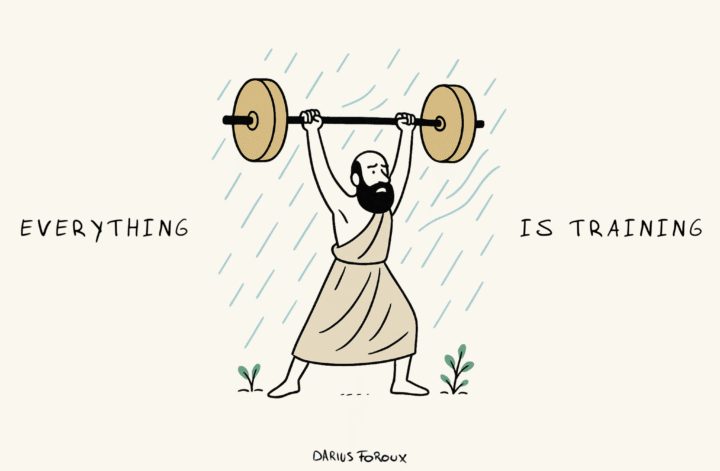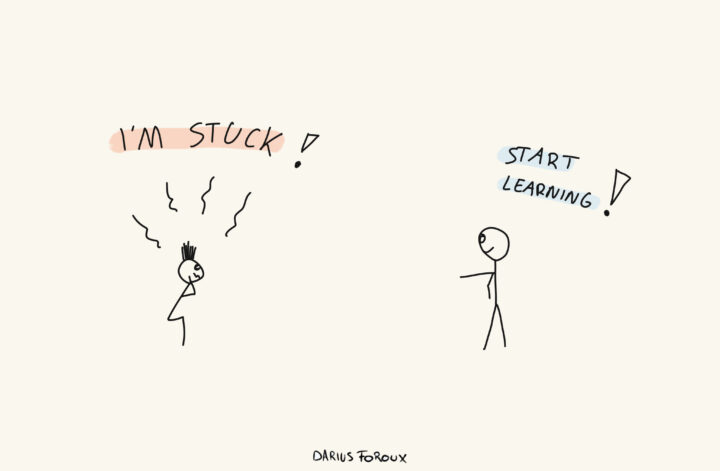Personal development is an abstract topic, which means different things to different people. And there’s no singular strategy for measuring it.
What does “personal development” mean? The word implies that there’s a progression to it. So if that’s the case, in what stage are you now? I’ll briefly answer those questions in this article. Equipped with that information, you can improve yourself more effectively.
What is personal development?
When I talk about personal development, I’m talking about the activities that will make you a reliable human being. Someone you can count on.
To me, it’s the modern version of philosophy. In Ancient Rome, philosophy was mostly a practical pursuit. There were actual schools where you could study the art of becoming a better person.
Along the way, we’ve turned philosophy into an academic pursuit. It’s turned into an analysis of who said what, and why.
The word philosophy comes from the Greek word φιλοσοφία, philosophia, which means the love of wisdom. Historically, a philosopher was a practitioner of the knowledge they possessed.
Well-known ancient philosophers like Aristotle, Socrates, Seneca, Epictetus, Buddha, Confucius, were all practitioners of their knowledge—they practiced what they preached. This trend remained true until the 19th century.
Modern philosophers like William James and Sigmund Freud all practiced philosophy. They mostly had other jobs. James was a psychologist and later became a teacher. Freud was a neurologist.
But in the 20th century, philosophers became talkers of knowledge. Philosophy became an academic career—it didn’t matter whether you practiced your knowledge. Why is it important to know this history? We all have a thirst of wisdom, so we need to get it from somewhere.
So when philosophy started changing last century, other people filled the gap. Who were those people? It started with Napoleon Hill, Wallace D. Wattles, Earl Nightingale, Jim Rohn, and other figures who are now active in the personal development space.
Instead of going to ancient school of philosophy, we join online communities, read blogs, and learn from each other. The goal is to become a better, more reliable, human being.
The four stages of personal development
I’ve identified four stages of personal development. Awareness of these stages help us understand where we are in our journey towards becoming a better person. By understanding where you are, you can take the necessary steps in your personal development.
1. Discovery
All growth comes from pain. Without a reason to pursue self-actualization, we never start. Every person goes through a period of darkness and challenge in their lives. This is where most of us discover the power of self-development.
I was always interested in productivity, business, and personal development. But I didn’t take it seriously until 2014/2015. I was going through personal challenges like dealing with loss, lack of career perspective, a break up, back pain, you name it. None of those challenges were huge by themselves, but the combination was tough. At some point, you start looking for answers.
Around the same time, my brother was also going through that phase. So we shared books and inspired each other to learn more.
2. Consumption
Once you discover the world of personal development, you become hopeful. You realize, “Hey, I can turn my life around. I can become better, stronger, more reliable.” So you go on a whole consumption spree.
You read books, blogs, listen to podcasts, watch documentaries—your thirst for knowledge is endless. When you’re in this stage, keep on drinking from the well of knowledge, my friend.
3. Application
I spent about 18 months consuming everything I could. I mean that literally. I was reading, listening, and watching inspiring things all day long. I read 2 to 3 books a week, journaled at least an hour a day, and listened to podcasts or watched interviews every hour.
But you can’t do that forever. At some point, you want to live what you’ve learned. So you start applying it to your personal life, health, career, business, etc. You start seeing changes. You embody the knowledge you’ve acquired.
4. Teaching
Once you’ve learned and applied your knowledge successfully, you want to share it with others. This could be with your family, friends, co-workers, team, or strangers.
Not everyone who goes through the stages of self-development becomes a teacher by profession, but everyone I’ve met who improved themselves, also wants to inspire others to do the same. You don’t have to tell others to improve.
Just by setting the right example, you’re inspiring others how to do the same. To me, that’s the real purpose of teaching.
Finally, these stages are not mutually exclusive. It depends on the area you’re focusing on. One might be at stage three when it comes to personal productivity, but at stage one when it comes to developing self-reliance.
This sums up the four stages of self-development. If we’re lucky, we can spend the majority of our lives in the final stage. But all stages are great places to be. It beats “stage 0” which is where the majority of the population live—in a state of unawareness. Anything beats that!
Especially learning. If that doesn’t excite you, nothing can!




